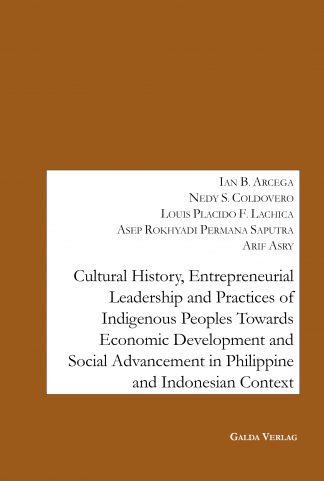Description
Entrepreneurial leadership of Indigenous People (IP) focuses on using pre dispositions, behaviours, and skills used to spot opportunities and exploit them for the existing resources and contexts and not on adapting their organisations.
This study explored the entrepreneurial leadership and practices of the IPs: Atis (Aetas) in Dumarao, Capiz, Philippines; and Maduranese in Indonesia towards economic development and social advancement. This was a qualitative research. It was found that the Atis have poor indigenous leadership and no organised business enterprise in Dumaro.
In marketing their items, purchasers obtained them at low costs. Conversly, the Maduranese have entrepreneurial mindset, very receptive to their society, do not see poverty as a hindrance to growth and development, and made ways to sustain their standard of living if there is an opportunity.
About the Authors/ Contributors
Dr. Ian B. Arcega graduated BS Commerce, MPA, MBA and finished his Doctor of Management in Business Management at Central Philippine University; Dean, College of Management, Capiz State University, Capiz, Philippines.
Dr. Nedy S. Coldovero graduated BSEd English, MAT English and finished her PhD in Literature at the University of Santo Tomas, Manila; a faculty member of Capiz State University, Capiz, Philippines.
Dr. Louis Placido F. Lachica graduated BSEd English, MAT English, and finished his PhD in Development Communication at the University of Los Baños; Director of the University’s Social Science and Industrial Technology Research and Development Center.
Dr. Asep Rokhyadi Permana Saputra is a lecturer in Management Study. Program Director of Universitas Marcu Buana Yogyakarta, Indonesia.
Mr. Arif Asry is the Chairman of Pasir Gamplong Small Enterprises in Desa Wisata Gamplong, Bantul, Yogyakarta, Indonesia.
Table of contents
Acknowledgments |page i
Table of Contents |page iii
List of Figures |page v
List of Tables |page vii
I The Problem and Its Background
1.1 |page 1
1.1.1 The Atis or Aetas of the Philippines |page 1
1.1.2 Cultural History, Territoriality, Self-Identity, Socio-political Structures, and Self-Determination of Aetas at the Local Level in the Philippines |page 6
1.1.3 The Maduranese of Indonesia |page 11
1.1.3.1 History |page 11
1.2 Objectives/ Statement of the Problem|page 14
II Review of Related Literature III Framework of the Study | page 17
3.1 Theoretical Framework |page 23
3.2 Conceptual Framework |page 2527
IV Research Design and Methodology
V Presentation, Analysis, and Interpretation
5.1 Entrepreneurial Leadership Skills, Practices, and Challenges |page 29
Encountered by the Atis and Maduranese |page 29
5.1.1 The Ati (Aeta) Business Players |page 37
5.1.2 Unnamed Atis (Aetas|page 39
5.1.3 Training Provided to the Atis (Aetas) |page 39
5.1.4 The Maduranese Business Players |page 40
VI Conclusions and Recommendations |page 51
6.1 Conclusions |page 51
6.2 Recommendations |page 52
6.3 Output |page 53
References |page 55
Abstract |page 59
Authors’ Profile |page 61


